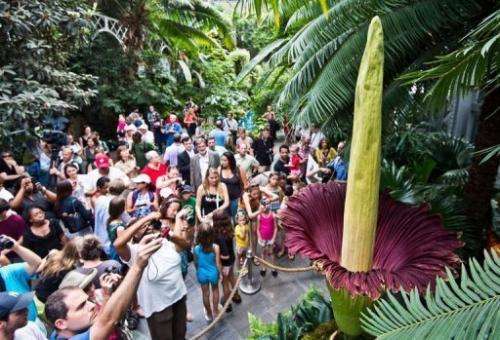Stinky corpse flower blooms in Washington

A towering plant that smells like rotting meat and is native to the Indonesian rainforest is in full bloom in the US capital, drawing throngs of tourists, officials said Monday.
The titan arum, among the world's largest plants, began blooming on Sunday at the United States Botanic Garden, and its petals are expected to stay open for just 24 to 48 hours.
"Then it will collapse quickly," said the Botanic Garden, which is broadcasting the flower and the camera-raising crowds it is drawing live on the Internet.
The flower is eight feet tall (2.4 meters) and smells of decomposing flesh in order to attract pollinators like dung beetles.
Its blooming is unpredictable, and may happen every few years or every few decades.
"The plant requires very special conditions, including warm day and night temperatures and high humidity, making Botanic Gardens well suited to support this strange plant outside of its natural range," the garden said.
The plant was first discovered in 1878 and the last time one bloomed at the US Botanic Garden was in 2007.
"We have had more than 98,000 people come visit from July 11 through July 21... unbelievable number of people!" said garden spokeswoman Laura Condeluci.
Visitors waited in line in soaring summer heat for a chance to see and smell the flower, but some were disappointed that the worst of the stench had already passed.
"Not nearly as smelly as I had hoped," tweeted one visitor named Robin.
© 2013 AFP



















